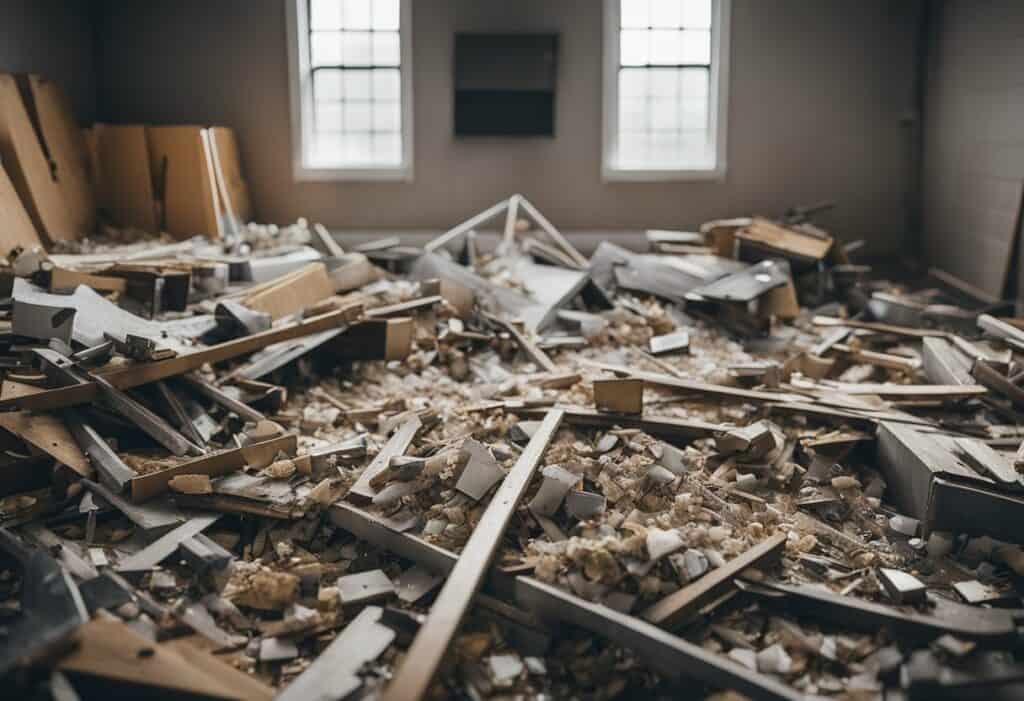Renovation Debris: Transform Your Space with a Fresh Start
Renovation debris is an inevitable aspect of any renovation project. It is the waste that accumulates during the construction or renovation process. This debris can include materials such as bricks, concrete, wood, tiles, and other construction materials. Proper management of renovation debris is essential for both contractors and property owners to ensure a safe and clean environment.

Planning your renovation project should include managing the debris that will be generated. This should be done before the project starts. It is important to have a clear plan for the disposal of the debris, as it can be hazardous to the environment and human health. Homeowners and contractors should work together to ensure that the debris is disposed of properly. This may involve hiring a waste management company or taking the debris to a designated waste disposal site.
Managing renovation debris is crucial to maintaining a safe and clean environment. Proper disposal of the debris can prevent environmental pollution and reduce the risk of accidents. Contractors and homeowners should work together to ensure that the debris is disposed of in the most appropriate manner. This may involve hiring a waste management company or taking the debris to a designated waste disposal site.
Key Takeaways
- Proper management of renovation debris is essential for maintaining a safe and clean environment.
- Planning for the disposal of debris should be done before the project starts.
- Contractors and property owners should work together to ensure that debris is disposed of properly.
Planning Your Renovation

Renovating your home can be an exciting and rewarding experience. However, planning and executing a renovation project can be a daunting task. To ensure a successful renovation, it is important to navigate regulations and permits, select the right contractor, and budget and schedule the project properly.
Navigating Regulations and Permits
Before starting any renovation project, it is important to understand the guidelines and regulations set by the Housing & Development Board (HDB) and the Ministry of National Development. You must obtain HDB’s prior approval before carrying out any renovations in your flat. This includes obtaining a renovation application and ensuring that your renovation contractor follows all regulations and by-laws.
Additionally, you must ensure that your renovation contractor removes and disposes of debris at a National Environment Agency (NEA)-approved site. If your Town Council does not provide a debris removal service, you or your contractor must not throw the debris down the refuse chutes or wash it down the WC squat pan or floor trap.
Selecting the Right Contractor
Selecting the right renovation contractor is crucial to ensure the quality, safety, and structural integrity of your home. You can refer to the HDB’s directory of renovation contractors to find a reliable contractor. Before hiring a contractor, ensure that they have the necessary licenses and permits, and that they use high-quality materials.
You can also ask for references and check their previous work to ensure that they have a good track record. It is important to communicate your expectations clearly and ensure that the contractor understands your vision for the project.
Budgeting and Scheduling
Budgeting and scheduling are important aspects of any renovation project. You must ensure that you have a realistic budget and work schedule before starting the project. This includes determining the pricing for materials, labour, and any additional costs.
It is important to communicate your budget and work schedule clearly with your renovation contractor to avoid any misunderstandings. You can also consider breaking down the payment into instalments to ensure that the work is completed to your satisfaction before making the next payment.
By following these guidelines, you can ensure a successful and safe renovation project.
Managing Renovation Debris

Renovating your flat can be an exciting experience, but managing the debris generated during the process can be challenging. Here are some tips to help you manage renovation debris effectively.
Debris Disposal Guidelines
Proper disposal of renovation debris is essential to maintain a clean and safe environment. Follow the debris disposal guidelines set by your town council to avoid penalties and demerit points. Your renovation contractor should remove and dispose of debris at NEA-approved sites or use debris removal services provided by the town council. Do not throw debris down the refuse chutes or wash it down the WC squat pan or floor trap.
Minimising Disruption
Renovation works can cause noise disturbance to your neighbours. To minimise disruption, carry out renovation works during permitted hours and avoid using power tools during the neighbourhood clean-up time. Hacking and demolition works should be carried out within the flat during the permitted hours to minimise noise and dust disturbance to your neighbours.
Post-Renovation Clean-Up
Post-renovation cleaning is essential to remove harmful particles, such as dust and debris, that can cause allergies and respiratory issues. Ensure that your renovation contractor cleans up the site after completion of the building works. You can also engage a professional house cleaning service to clean your flat, including walls and ceilings, floors, kitchen, and bathrooms. Consider getting your mattress cleaned to remove any debris that may have accumulated during the renovation process.
Understanding the guidelines for managing renovation debris is crucial to ensure a hassle-free renovation experience. Always engage BCA-approved window contractors and BCA-trained air-conditioner installers to prevent lift misuse and ensure the safety of your flat. Regular checks and site inspections can help to prevent illegal dumping of debris and notice of composition to errant contractors. In case of disputes, you can file a claim at the Small Claims Tribunals for a fine or penalty.
Frequently Asked Questions

How can I efficiently remove debris after my home makeover?
During a home renovation, disposing of debris is a crucial step in ensuring a clean and safe living environment. You can efficiently remove debris by separating recyclable materials and disposing of them in the appropriate waste bins. For larger items, such as furniture or appliances, consider donating them to local charities or arranging a pick-up service with your local council. Additionally, hiring a professional cleaning service can ensure that all debris is removed and disposed of correctly.
What are the costs involved in disposing of remodelling waste?
The costs of disposing of remodeling waste will depend on the amount and type of waste generated. Some local councils offer free or low-cost waste disposal services, while others may require a fee. Consider hiring a professional waste removal service to ensure that all waste is disposed of correctly and safely.
What should I do if I’m disturbed by loud refurbishment works?
If you are disturbed by loud refurbishment works, consider talking to your neighbours or the contractor to find a solution. If the noise is excessive or outside of permitted hours, you can contact your local council’s environmental health department to make a complaint.
Where can I find a local service for clearing out construction rubbish?
You can find a local service for clearing out construction rubbish by searching online directories or contacting your local council for recommendations. It is important to ensure that the service provider is licensed and insured to carry out the work.
What steps are necessary to ensure my refurbishment complies with planning permissions?
To ensure that your refurbishment complies with planning permissions, it is important to obtain the necessary permits and approvals before starting the work. You may need to consult with a planning officer to determine what permissions are required for your specific project.
How should I handle leftover materials from my flat’s refurbishment?
Handling leftover materials from your flat’s refurbishment depends on the type of materials and their condition. Consider donating usable materials to local charities or recycling centres. For hazardous materials, such as asbestos, it is important to seek professional help for safe removal and disposal.



